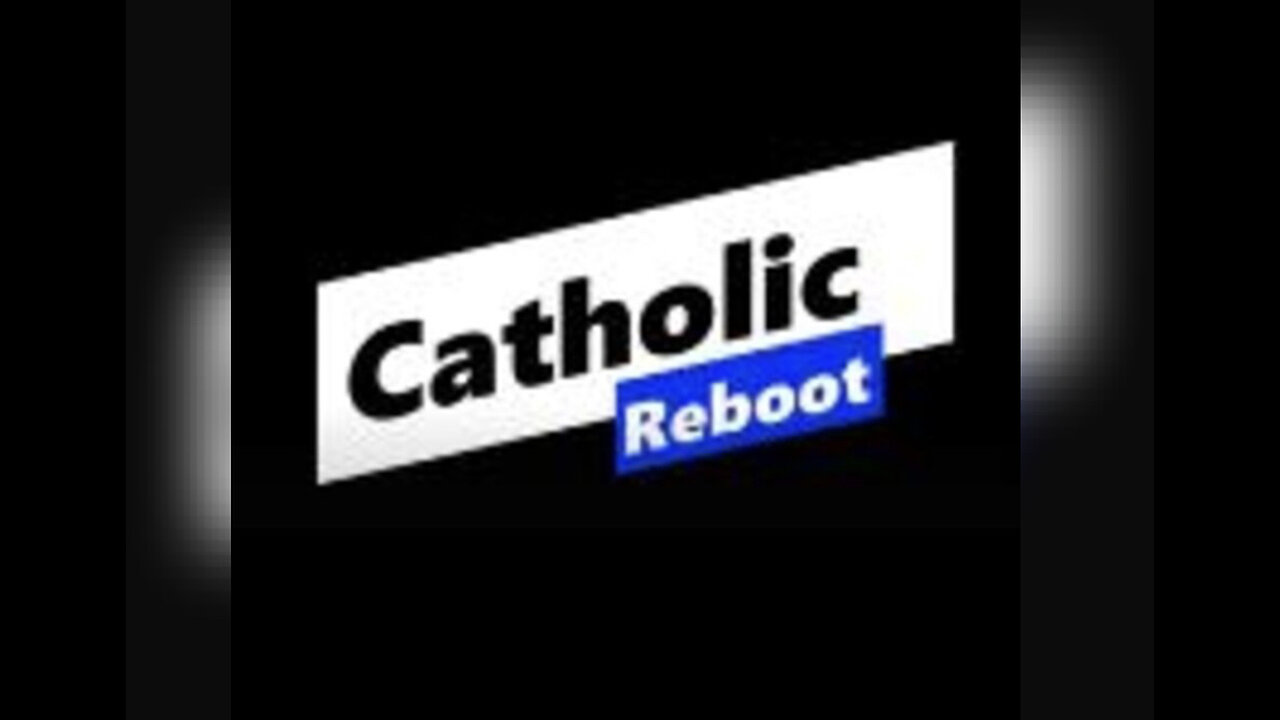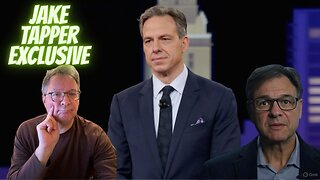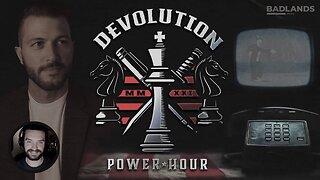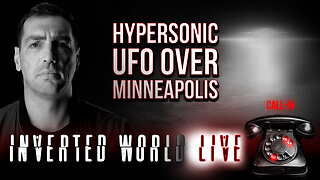Premium Only Content

Episode 3115: The Sacraments and the Indefectibility of the Church: A Father's Last Stand
"The Sacraments and the Indefectibility of the Church: A Father's Last Stand"
Opening Prayer
In nomine Patris, et Filii, et Spiritus Sancti. Amen.
O God, Who through Thy Son Jesus Christ did institute the holy sacraments for the salvation of souls, grant us clarity of mind, firmness of faith, and hearts full of charity. Let no doubt confound us, no fear mislead us, and no error ensnare us. Through the intercession of Mary, Seat of Wisdom, and St. Robert Bellarmine, may this episode bring light, fidelity, and healing to all who listen.
Through the same Christ our Lord. Amen.
Introduction
Dear listeners, welcome to another episode of "Truth in Charity." I am your host, Walter Viola. Today we confront a deeply personal and yet theologically crucial issue: the question of the validity of post-1968 ordinations and sacraments, particularly as it pertains to the crisis of faith my 99-year-old father has experienced in recent years.
Before I get started on this subject matter there is a problem of many Catholics both Novus Ordo and Traditionalists. This episode may surprise you because it challenges both the modernist misuse of experience and the reactionary temptation of sedevacantism, showing that both ironically share a common root: subjectivism.
Let’s begin.
What is Phenomenology?
Phenomenology is a philosophical method developed by Edmund Husserl in the early 20th century. Rather than starting with objective truths or metaphysical principles as St. Thomas Aquinas did phenomenology starts with subjective experience: how things appear to the individual.
Later thinkers, like Max Scheler, took this further, exploring how we experience love, shame, beauty, and personhood. These ideas heavily influenced Karol Wojtyła, who became Pope John Paul II.
He brought phenomenology into the heart of modern Catholic thought, blending it with Thomism. This resulted in things like:
• Theology of the Body,
• Personalist ethics,
• and a deeper focus on the dignity of the human person.
On the surface, that sounds like a good thing and in many ways, it is. But there’s a danger lurking beneath: when experience becomes the measure of truth, we begin to slide into relativism.
How Did Phenomenology Affect Church Teaching?
1. Theology of the Body
Pope John Paul II’s Theology of the Body explored the meaning of the human body, marital love, and sexuality not just by citing dogma, but by exploring the experience of being male or female, the experience of self-gift, shame, and love.
Positives? It elevated the dignity of the person and shed light on the sacramental meaning of the body.
Danger? Without solid metaphysics, this can lead to emotional theology, where feelings trump doctrine.
2. Conscience and Moral Theology
Phenomenology emphasized the internal dimension of moral decisions: intentions, inner movements, the role of conscience.
But without firm anchoring in the objective moral law, this often degenerates into:
“Well, I feel this is right... so it must be right for me.”
This is exactly the kind of subjectivism that Pope Pius X condemned in his encyclical Pascendi Dominici Gregis, where he called modernism “the synthesis of all heresies.”
3. Liturgy
Post-Vatican II reforms, also influenced by phenomenological thinking, emphasized active participation and communal experience.
Unfortunately, this often led to:
• Guitars instead of Gregorian chant
• Emphasis on “community” instead of sacrifice
• Masses that feel more like social gatherings than sacred worship
The transcendence of God was traded for human-centered experience.
The Root Problem: Subjectivism
So what’s the pattern?
Whether it’s theology, conscience, or liturgy, phenomenology when separated from the objective truths of the Faith risks making experience the standard.
“How I feel about something” becomes more important than what God has revealed.
That’s subjectivism. And it’s spiritually dangerous.
But Here’s the Twist: Sedevacantism Makes the Same Error
Now here’s where it gets interesting and perhaps challenging.
Sedevacantists rightly reject modernism, Vatican II confusion, and the abuses of the Novus Ordo. But in doing so, many of them fall into the exact same error they denounce.
They substitute objective Church authority with their own private judgment.
Let’s take a closer look.
What do Sedevacantists say?
• “There hasn’t been a valid pope since Vatican II.”
• “The Church has defected.”
• “I know this because canon law and private opinion tell me so.”
They declare the pope invalid, the bishops heretical, the sacraments null all based on their personal interpretation of Church teaching and history.
But who gave them that authority? No one.
They become their own magisterium. And what is that, ultimately? Subjectivism.
The Irony
Phenomenology says:
“Truth is what I experience.”
Sedevacantism says:
“The Church is what I believe it should be.”
Both put the self at the center not Christ, not the Deposit of Faith, not the visible, hierarchical Church founded by Our Lord.
The result? Division, confusion, pride, and spiritual instability.
What’s the Catholic Response?
The true path is neither the emotional relativism of modernism nor the rigid pride of sedevacantism. The answer is the perennial philosophy of St. Thomas Aquinas and the unbroken tradition of the Church.
• God’s truth is not subjective.
• The Church remains visible, even in crisis.
• Bad popes do not destroy the Church.
• Our job is obedience, humility, and fidelity to what has been handed down.
St. Athanasius didn’t start his own church during the Arian crisis. He suffered, endured exile, and remained faithful without becoming a schismatic.
A Word from Sacred Scripture
“Jesus Christ, yesterday, and today: and the same forever. Be not led away with various and strange doctrines.”
— Hebrews 13:8-9
Let’s not be seduced by feelings or fears. The Church is in crisis yes but Christ is still her Head. Truth is not invented; it is revealed. And that truth is safeguarded by the Catholic Church, not by private thinkers or fringe movements.
Let us return to the clear teachings of the saints, the doctrines of the Councils, and the grace of the sacraments offered not in novelty or pride, but in reverence, tradition, and truth.
This episode was born out of correspondence with the Traditio Network regarding their position on this very matter. Their assertion that the new rites of ordination promulgated after Vatican II are invalid has caused grave concern for our family, as my father has since withdrawn from the sacraments entirely. I share this not to inflame division, but to bring clarity, founded in Catholic teaching and tradition.
A Father Withdraws
My father, now in the final stretch of a long and faithful life, made a decision that shook our family to its core. After decades of receiving the sacraments regularly. Mass, confession, and even spiritual direction he declared that he would no longer receive them. His reason? He believed that no priest ordained after 1968 regardless of his apparent orthodoxy could validly confer the sacraments.
This decision did not come lightly. It was the result of years of reading, online discussions, and correspondence with those in the sedevacantist or extreme traditionalist sphere. They had convinced him that the entire visible structure of the Catholic Church had defected that what we now see as the Church is in fact a counterfeit, a "Newchurch," and that the new rites of ordination promulgated by Paul VI are null and void.
For him, this meant that every Mass, every confession, and even Extreme Unction administered by priests ordained in these rites were not only suspect they were invalid. No grace. No forgiveness. No sacramental presence of Christ.
The impact on his soul and on the souls of those who love him has been profound. We have watched a man who once reverently received the Body of Christ every week now sit silently in his pew, arms folded, mistrustful even of the confessional.
The Heart of the Debate
Let us now turn to the heart of this theological dispute. At issue is the claim that the rites of ordination instituted in 1968 under Pope Paul VI the new "Pontificale Romanum" are intrinsically invalid.
Traditio and other voices in this camp assert that these rites were modeled after Protestant ordinals, stripped of explicit references to the sacrificial priesthood, and are therefore null. According to them, the Church has not merely been damaged it has been replaced.
They argue that this new rite broke with tradition in a way so essential, so severe, that apostolic succession was effectively cut off. As they see it, the true Catholic Church now exists only in underground chapels and resistance groups. The post-conciliar visible Church, they say, is a deceptive facade.
But this view presents a grave theological problem: it implies that the Church, the very Ark of Salvation founded by Christ, has defected in her sacramental life. If such a defection were true, then the Church has ceased to be the Church. And that is a claim no faithful Catholic can entertain.
The Doctrine of Indefectibility
The doctrine of the Church's indefectibility is a cornerstone of Catholic ecclesiology. It teaches that the Church, as the Mystical Body of Christ and the Bride of Christ, cannot fail in her essential elements her doctrine, her sacramental life, and her apostolic governance.
The First Vatican Council, in Pastor Aeternus, reaffirmed that the Church enjoys divine protection from error in these areas. Pope Leo XIII, in Satis Cognitum, declared:
"If the living magisterium could in any way be false or deceptive, then the Church herself would be false and deceptive a blasphemy."
St. Robert Bellarmine powerfully stated:
"If the Church were to defect universally in faith or sacraments, it would cease to be the true Church, which is impossible."
To claim that the Church universally promulgated invalid sacraments is to assert that Christ failed in His promise:
"And behold, I am with you all days, even to the consummation of the world" (Matthew 28:20).
This would mean that Christ allowed His Bride to teach error and confer false sacraments to the faithful on a global scale.
No traditional theologian prior to Vatican II not even in the deepest crises of Church history ever made such a claim.
Validity vs. Licitness
The distinction between a valid sacrament and a licit one is critical.
A sacrament may be celebrated unlawfully outside of the Church’s norms and still be valid if it contains the essential elements: matter, form, and intention. This is precisely what the Church teaches in Sacramentum Ordinis, issued by Pope Pius XII in 1947.
According to that document:
• The essential matter for ordination is the laying on of hands.
• The essential form is the consecratory prayer indicating the grace and office being conferred.
The new rite of ordination retains both. While critics may object to ambiguous wording or modernist influence, ambiguity is not the same as defect. The essential intention to do what the Church does remains presumed unless explicitly rejected.
To argue otherwise is to move from theological critique to dogmatic rupture.
Donatism Revived?
There is a disturbing resemblance between the claims made by radical traditionalists and the ancient heresy of Donatism.
The Donatists of the 4th century insisted that sacraments were invalid if administered by unworthy or impure ministers. They rejected the idea that Christ could work through sinful clergy.
The Church responded forcefully. St. Augustine taught:
"It is not the minister, but Christ, who confers the sacrament."
This truth is echoed in the Church’s teaching on ex opere operato that sacraments work by the work performed, not by the worthiness of the minister.
By denying the validity of post-1968 sacraments solely on the basis of their form or the presumed rupture in apostolic succession, some traditionalists walk dangerously close to Donatism, despite claiming to uphold tradition.
The Burden of Proof
Catholic theology presumes the validity of sacraments unless a defect is clearly demonstrated. The burden lies not with the Church, but with the accuser.
Canon law upholds this presumption. Unless a priest explicitly rejects the Church’s intention or uses matter or form that clearly deviates from defined sacramental essentials, we are not permitted to presume invalidity.
The principle of ecclesia supplet that the Church supplies jurisdiction in situations of doubt further safeguards the faithful.
To declare that every ordination post-1968 is null, one would have to prove that every bishop lacked intention, that every rite deviated from the essential form, and that every recipient lacked proper disposition. This burden is not just unreasonable it is impossible.
The Risk of Scandal and Spiritual Harm
Let us now consider the real-world consequences.
My father has refrained from receiving the sacraments. He has discouraged others from doing so. He fears he will be participating in a false Church if he accepts Extreme Unction or Confession.
And he is not alone.
Families across the world face this spiritual isolation, not because of the failures of the Church, but because of theological errors passed off as tradition. This leads to despair, spiritual loneliness, and estrangement from grace.
What begins as fidelity to tradition can devolve into a distrust of Christ’s own institution. This is a betrayal of both reason and faith.
A Call to Responsibility and Clarification
Those who speak publicly, who write and teach on matters of sacramental theology, must do so with clarity, humility, and accountability.
I reached out to Traditio for clarification. Their response only entrenched their position. They claimed that the Church was replaced in 1964 by a "Newchurch." They denied the validity of all post-1968 ordinations.
But this is not what Archbishop Lefebvre taught. It is not what Fr. Hesse taught. It is not what the Doctors and Saints of the Church have taught.
I do not ask for silence. I ask for doctrinal fidelity. I ask for accountability.
Because the stakes are not academic. They are eternal.
Sedevacantism: A Protestantism in Disguise
We must confront a difficult truth: that sedevacantist groups, while appearing outwardly traditional, fall into the same theological errors as Protestants.
Like the Reformers, they reject the visible structure of the Church. Like the Reformers, they elevate private judgment above ecclesial authority. And like the Reformers, they encourage the faithful to abandon the sacramental life instituted by Christ.
Martin Luther rejected the visible Church because of corruption. Sedevacantists reject the visible Church because of perceived doctrinal failure. Both assert that the true Church went into hiding and both fail to uphold Christ’s promise that His Church would endure visibly and sacramentally until the end of time.
Worse still, they lead faithful Catholics into dangerous territory. To urge people to abandon confession, the Holy Eucharist, or the sacraments at the hour of death is a direct assault on the mission of Christ. This is not traditionalism it is theological anarchy dressed in Latin vestments.
Traditional Catholicism is not defined by hatred of Rome. It is defined by fidelity to the unbroken line of apostolic teaching and the sacramental system instituted by Christ.
Conclusion
The Church is in crisis, yes. But she has not failed. The sacraments remain effective. Apostolic succession continues. Christ has not abandoned His Bride.
To reject all sacraments since 1968 is to commit a spiritual suicide. To cling to fear rather than trust is to reject Christ’s promise.
Let us love the tradition but let us not destroy the sacramental life of the Church out of reactionary despair. Let us correct errors, but not invent new ones.
Furthermore, it must be said clearly: online outlets such as Traditio, which propagate sedevacantist theology and encourage distrust in the visible Church instituted by Christ, do far more harm than good. Their claims often lead souls away from the sacraments, away from confidence in Divine Providence, and into a spiritual wilderness where pride, confusion, and despair replace the peace of Christ.
They present themselves as defenders of tradition, but in reality, they fracture unity, attack the apostolic nature of the Church, and undermine the work of legitimate traditional priests and religious communities who operate in fidelity to Rome.
As faithful Catholics, we must exercise discernment. We must reject the extremes that deny the Church’s visibility, her sacramental power, and her divine constitution. Instead, we must anchor ourselves in what has always been believed: that the Church, even in crisis, remains the Ark of Salvation.
Closing Prayer
O Lord Jesus Christ, Eternal High Priest, grant that we may never be led astray by fear or falsehood. Uphold Thy Church, preserve Thy sacraments, and strengthen Thy faithful in these days of trial.
May my father—and all who have withdrawn from the sacraments—return with confidence, peace, and faith to the means of grace Thou hast provided.
O Mary, Mother of the Church, intercede for us. St. Joseph, Patron of the Dying, pray for us. St. Robert Bellarmine, defender of the faith, guide us.
In nomine Patris, et Filii, et Spiritus Sancti. Amen.
-
 18:28
18:28
GritsGG
12 hours agoINSANE 50 Bomb! Warzone's Most Winning Player FRIES Bot Lobby!
1.26K1 -
 LIVE
LIVE
Lofi Girl
2 years agoSynthwave Radio 🌌 - beats to chill/game to
121 watching -
 56:38
56:38
DeProgramShow
5 days agoDeprogram with Ted Rall and John Kiriakou: "Jake Tapper on the Global Hunt for an Al Qaeda Killer”
66.1K7 -
 3:44:21
3:44:21
FreshandFit
11 hours agoWhat Can These Women Give A Man That They've Never Given Before? ft. Surprise Guests
242K65 -
 2:29:28
2:29:28
Badlands Media
14 hours agoDevolution Power Hour Ep. 400: The 400th Episode Celebration – Trump’s Gamble, Biden’s Fall, and the Great American Reckoning
75.5K37 -
 2:05:10
2:05:10
Inverted World Live
7 hours agoHypersonic UFO Over Minneapolis | Ep. 128
80K16 -
 2:50:41
2:50:41
TimcastIRL
8 hours agoDemocrat Press IS DEAD, Timcast JOINS Pentagon Press Corps Sparking OUTRAGE | Timcast IRL
231K94 -
 1:32:24
1:32:24
Tucker Carlson
7 hours agoTucker and MTG on the 5 Pillars of MAGA and the Snakes in Washington Trying to Tear Them Down
65K297 -
 LIVE
LIVE
Side Scrollers Podcast
3 days ago🔴FIRST EVER RUMBLE SUB-A-THON🔴DAY 3🔴PLAYING MIKE TYSON'S PUNCH OUT TILL I WIN!
919 watching -
 17:14
17:14
Mrgunsngear
8 hours ago $19.85 earnedUpdate: Current Glocks Discontinued & Glock V Series Is Coming!
38.5K31